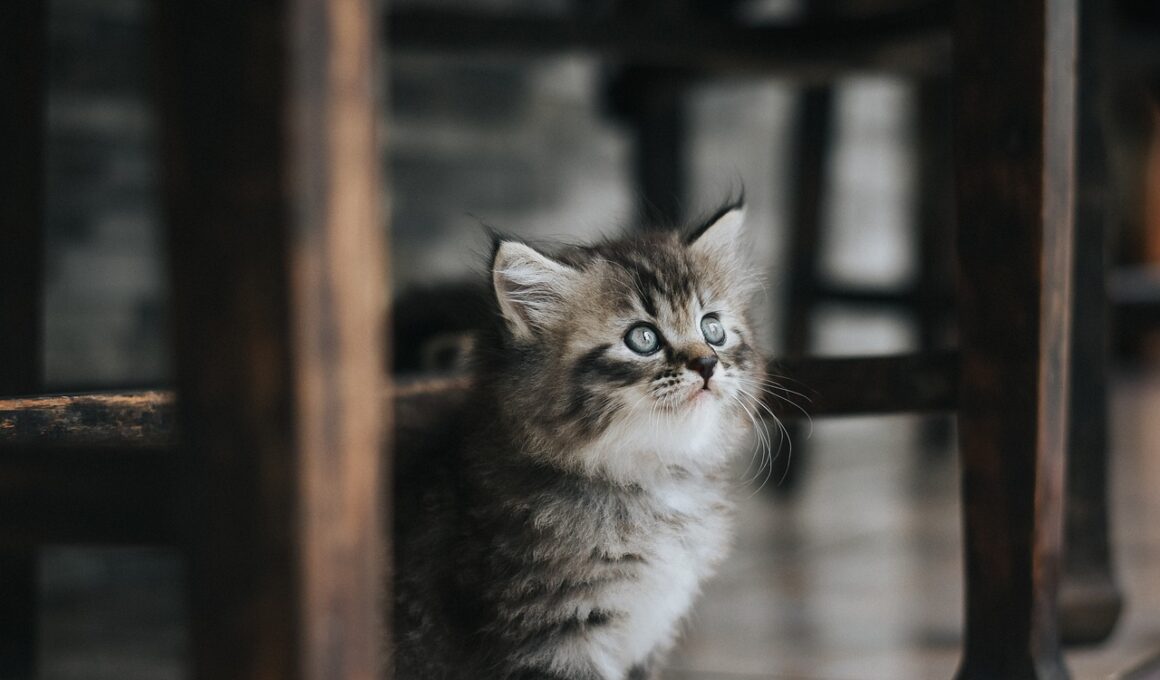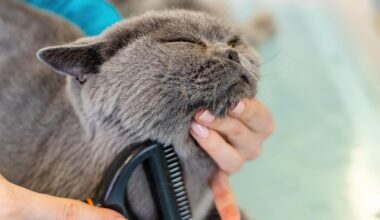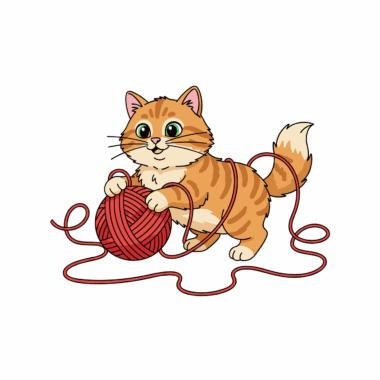The Effects of Early Weaning on Kitten Behavior
Weaning is a critical period in a kitten’s life, typically occurring between four and eight weeks of age. The timing of this process can significantly impact their behavior and development. Kittens weaned too early may lack essential social skills developed through interactions with their mother and littermates. These skills include understanding feline body language and appropriate play behavior, which are usually learned during the weaning phase. As a result, early-weaned kittens can exhibit various behavioral issues, such as aggression or withdrawal. Understanding the effects of early weaning helps cat owners provide better environments for their pets. Cat behavior can be unpredictable; thus, recognizing the challenges early-weaned kittens face is crucial. Behavioral training and socialization efforts should be adjusted for these kittens to mitigate adverse effects. Owners should be particularly observant of their kitten’s behavior and consult with professionals if necessary. An early weaned kitten may struggle with social interactions later in life, emphasizing the importance of fostering their development during crucial stages. Ensuring a gradual weaning process can promote balanced behaviors and happier, healthier cats in the long term.
Research shows that the timing of weaning affects kittens psychologically. Early weaning can lead to attachment issues with humans and other animals. These kittens may grow up socializing poorly with both humans and other cats. They may find it challenging to build bonds and could become aggressive during play or fearful of unfamiliar situations. The lack of experience with learning limits their capacity to adapt in new environments. This deficiency can hurt their quality of life, influencing their willingness to explore their surroundings. Behavioral problems stemming from inappropriate weaning can include litter box issues and food aggression. Regular socialization and environmental enrichment for weaned kittens can mitigate these challenges. Owners should introduce various stimuli, such as toys and environmental changes, as they grow. Gradual exposure to new people and pets is essential to develop secure and friendly relationships with others. Engaging in interactive play is another important avenue for fostering appropriate behavioral responses in kittens. Providing consistent routines and limits can enhance their feeling of safety and security. Owners should be diligent to create a positive and playful atmosphere for their feline friends.
Understanding Kitten Socialization
Socialization is vital for kittens, impacting behavior well into adulthood. During the first few weeks of life, kittens learn valuable lessons through experience. They observe and engage with their mother, which helps in understanding normal behaviors and boundaries. Kittens weaned too soon may miss these social learning opportunities, leading to difficulties in interacting with their peers. The consequences can manifest as fearfulness or overstimulation during play, resulting in negative interactions with other animals. An improperly socialized kitten might develop a reputation as a “problem cat” in adulthood due to misinterpretations of their intentions. They may also exhibit anxiety around unfamiliar animals or even humans. Owners should be aware of the critical periods for socialization and actively participate in their kittens’ learning experiences. Techniques such as gently introducing them to friendly dogs or new environments can promote adaptability. Socialization also extends to vet visits and carrier training, which are essential for stress-free healthcare experiences. Encouraging the exploration of various environments and play styles will create more well-adjusted cats. The implications of socialization are profound, affecting their behavior and relationships throughout their lives.
The role of play in kitten behavior development is another crucial aspect. Play is not just a form of entertainment; it’s an essential tool for kittens to develop various skills. Through play, they practice hunting, develop motor skills, and learn valuable lessons about their own physical abilities. Kittens who play well demonstrate healthier social skills. Play also fosters bonding between kittens and their human caregivers, providing another way to promote secure attachment. However, if a kitten’s play is inhibited due to an early weaning experience, they may struggle to engage naturally with toys or other cats. This may stem from a lack of practice or fear. Toys that mimic prey can stimulate a kitten’s instincts while encouraging playful behavior. Using feather wands or laser pointers can help engage their hunting instincts and offer physical exercise. Social play with other kittens can also encourage cooperation and camaraderie. Owners should monitor play interactions to ensure they are positive and not overly aggressive. Early maturing play behaviors and interactions are essential for emotional and physical development in the long run.
Emotional Well-being and Behavior
A kitten’s emotional health heavily influences their behavior as they mature. Early weaning can create an insecure attachment style leading to anxiety and stress. Kittens often cope with emotional turmoil by displaying problematic behaviors, such as excessive grooming or hiding. These behaviors indicate stress or an inability to cope with change effectively. To help promote emotional well-being, a stable environment must be provided for a kitten after weaning. This environment should include familiar scents, safe spaces, and gradual introductions to novelty. Offering consistent interaction and gentle handling can encourage emotional safety. When these needs are addressed, the kittens are less likely to develop heightened reactivity or behavioral issues later on. Providing stimulation through play, training, and human interaction can soothe anxious behaviors. Owners can also build secure attachments by spending quality time sharing affectionate moments. Training should focus on positive reinforcement to create trusting relationships. Building these connections will greatly influence their future reactions to stressors. Addressing the aftermath of early weaning is crucial in ensuring that kittens develop into secure, emotionally balanced adults.
Another significant consequence of early weaning involves health issues related to behavior. Kittens that experience inadequate maternal care may have lower immunity, making them more susceptible to illness. This, in turn, can create additional anxiety and stress, altering their behavior patterns. The increased health risks associated with a weak immune system can further exacerbate behavioral issues, creating a cycle that is difficult to break. Owners should pay close attention to their kitten’s health during formative weeks, ensuring they are checked by a veterinarian regularly. Preventative healthcare should include vaccinations and proper nutrition to help kittens become stronger and more resilient. Emphasizing a healthy diet rich in vitamins and minerals will positively impact physical well-being and optimal brain development. Kittens thrive on supervision and care, and nutritious food directly affects their energy levels and mood. A well-balanced diet supports emotional stability, leading to behavior positively reinforced. Pet insurance can provide protection for unexpected healthcare challenges related to behavioral issues stemming from early weaning. Maintaining physical health becomes a comprehensive effort that includes diet, vet visits, and attention to potential emotional needs.
Long-Term Implications of Weaning
The long-term implications of early weaning cannot be underestimated. Kittens that do not receive appropriate socialization and behavioral training may face chronic adjustment problems as adults. Their behavioral repertoire may be limited, making it hard for them to exhibit normal cat behaviors. Persistent anxiety or aggression can lead to further complications, such as difficulty in adopting into new homes or fitting into new family structures. These issues can not only affect the kitten but also its human family structure, potentially causing frustration over time. Long-term support systems may be required to help them adapt successfully. Continued socialization throughout early adulthood is essential for continuous growth. Interventions to address any behavioral issues should involve professional support to create positive outcomes for both the cat and the owner. Owners should embrace training opportunities that incorporate new experiences to help ease any difficulties. The socialization presented in the formative ages can determine behavioral tendencies in later years. Ultimately, the responsibility of ensuring a kitten’s well-adjusted state lies with the owner, requiring dedication and conscious efforts.
In conclusion, understanding the effects of early weaning on kitten behavior is essential for prospective cat owners and breeders alike. Early weaning can have profound consequences on emotional stability, health, and social behavior. The importance of mother’s nurturing touch and the gradual learning through interactions cannot be overstated. Ensuring that kittens go through adequate weaning under safe and social circumstances can influence their overall quality of life. Engaging properly in their developmental stages allows owners to foster positive attachments and healthier emotional states. The consequences of poor weaning practices become evident as the kittens mature, often leading to larger behavioral issues. When neglected, early-weaned kittens might not realize their full potential as friendly and affectionate companions. Awareness of the significance of weaning timing and parental involvement is necessary to counteract the possible adversities faced by kittens. Educators, veterinarians, and breeders should collaborate to promote optimal kitten development through better practices and education. Fostering a supportive environment allows kittens to thrive and grow into adaptable adults. By prioritizing these elements, cat owners can ensure joyful years with their feline friends.





